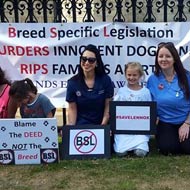
Campaign launched by two RVNs takes off
For the first time, veterinary professionals attended a peaceful protest in Westminster calling for an end to breed specific legislation (BSL).
Veterinary nurses Shakira Free and Gemma Plumer were among professionals who wore their uniforms at the event to take a stand against the legislation.
The pair have launched a campaign called The SaveABulls and are currently in the process of creating a government e-petition. If it reaches 100,000 signatures, the issue may be debated in parliament.
Under the Dangerous Dogs Act, 'types' of dogs are banned based on their physical appearance.
Speaking during the event, Shakira said: 'We stand here today, as two charity veterinary nurses united with you all in the same belief and determined to make a change.
"We believe that the current law (1991 dangerous dogs act) is failing…it is failing our pets…it is failing our patients…it is failing the public…day in and day out."
Gemma added: "We see a high percentage of bull breed dogs in our work and it has become clear to us that within the veterinary sector, knowledge and understanding of this law and BSL/breed discrimination is extremely limited.
"Together we aim to educate vets, nurses and other associated staff to alert them to what is expected of us when involved with type dogs, as well as ensuring the ability to educate owners informatively."
During the event, which is organised by DDA Watch, Shakira and Gemma met a number of BSL victims, including the Owen family. Their dog Bailey was seized by the police after a resentful family member reported them for being in possession of an illegal breed.
After Bailey spent 15 weeks in solitary confinement, he was reunited with his family as it was decided he was not a risk to the public. However, his owner has been left with a criminal record for owning a 'fighting' dog.
The family's two children, aged six and 10, are now ambassadors for bull breeds. Shakira commented: "It was great to see children of such a young age attending the protest. The youngest child Erin, said: 'But he didn't do anything wrong, but he got took.'"
A number of BSL victims gave speeches during the day, as well as veterinary behaviourist Kendal Shepard, behaviour counsellor Sarah Fisher and Sian Morton from DDA Watch.
The SaveABulls campaign has seen growing popularity on social media and its founders plan to attend conferences and give presentations to veterinary practices and youth groups.
For updates on their progress, see Twitter @SaveABulls or Facebook - facebook.com/pages/The-SaveAbulls/
Images courtesy of The SaveABulls campaign



 The veterinary mental health charity Vetlife is inviting the veterinary community to join it for a sponsored cold-water dip.
The veterinary mental health charity Vetlife is inviting the veterinary community to join it for a sponsored cold-water dip.